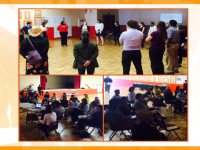
By Courtney Hendrix
Climate change can feel far removed, but in fact, communities are dealing with its health impacts every day. Last fall, PHI’s Center for Climate Change & Health funded three community organizations to undertake pilot projects aimed making the climate change-health connection, on the ground in their communities. In June the three Creating a Climate for Health pilot project grant recipients met with us in Oakland to share what they are discovering about connecting climate change to people’s everyday experiences.
On June 17th, the Social Justice Learning Institute (SJLI), the Environmental Health Coalition (EHC) and the Pacific Institute discussed the impact their work is having on the intersection of climate change and health. The approaches of the three projects vary, but common threads across all three highlight the need for deeper education on the connections between climate and health, and the importance of relationship and trust building.
Raising awareness of the local and personal impacts of climate change is essential. But what does that actually look like?
For the SJLI it’s about making existing data relatable to the experiences of Inglewood residents, and letting them define what adaptation and climate action means. For example, what are they feeling about and dealing with because of poor air quality? Why is there poor air quality? How can active transportation improve their health and while cleaning the air?
In San Diego and Tijuana EHC is engaged in deep education about climate change and health, and in cultivating individual behavior change that leads to greater community solutions. EHC provides education on climate change and health to La Maestra staff and patients, who in turn work together to educate San Diego’s government officials about the importance of the city’s Climate Mitigation and Adaptation Plan (CMAP).
Oakland’s Pacific Institute partners with the West Oakland Environmental Indicators Project to co-chair the Oakland Climate Action Coalition’s Adaptation and Resiliency Committee. The committee focuses on providing education on climate adaptation through informational games and by lifting up the personal experiences and resources of the community.
All three organizations emphasized that relationship and trust building are critical for developing and advancing climate and health action. Identifying and partnering with community leaders, trusted people in the community and other potential allies have been key to their success. They make the point that, in order for their work to be meaningful and sustainable, the communities most impacted by climate change have to be a part of the solution, and therefore must be involved throughout the process.
The SJLI underscored that for them, this means that leadership development is embedded in the work they do. They also discovered that they must remain flexible as an organization, with the ability to adapt to the needs of the community.
By working with La Maestra and Promotoras, EHC ensures that the work they are doing is culturally relevant and coming from trusted leaders in the local community. One of the most essential strategies for building trust and relationships is coming from a place of listening to and learning from the community.
The Pacific Institute demonstrates this by taking a strength-based approach to climate resilience. Pacific Institute holds conversations to hear from local residents about the assets they already have, and about the solutions residents feel are most appropriate for their community.
As Congress stalls on taking any real action to addressing climate change, it has become clear that it is up to each of us to take the lead. Climate change is the single biggest threat to our health and our environment. What the Creating a Climate for Health projects are demonstrating is that we can begin by taking action, individually and together, within our local communities.
Courtney Hendrix is the communications specialist at the Community Food and Justice Coalition (CFJC). CFJC partners on the Creating a Climate for Health project.


